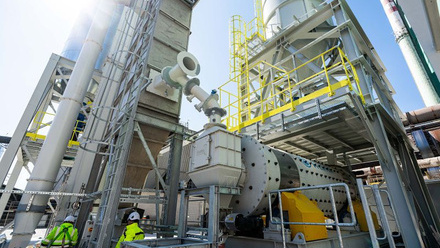IOM3 Responds to the launch of the new modern industrial strategy
The strategy is a ten-year plan intended to boost growth.
The Department for Business and Trade today launched the UK's modern industrial strategy. The strategy is a 10-year plan designed to deliver a favourable policy landscape for economic growth and resilience. The strategy outlines critical cross-sectoral challenges that must be overcome to enable long-term investment. This includes several areas that were highlighted in the IOM3 response to the industrial strategy green paper, including tackling high industrial energy costs, strengthening critical supply chains, addressing regulatory burdens and ensuring an adequate pipeline of skilled labour.
Priority sectors
The industrial strategy is structured around eight priority sectors, referred to as IS-8, which are considered to have the highest potential for growth over the coming decade. These sectors are advanced manufacturing, creative industries, life sciences, clean energy, defence, digital and technologies, professional and business services and financial services. Key takeaways for materials, minerals and mining industries across these sectors include:
Advanced Manufacturing
The government aims to nearly double annual business investment in the advanced manufacturing sector from £21 billion to £39 billion by 2035. The key subsectors prioritised by the government in this area are automotive, batteries, aerospace, space, advanced materials and agri-tech. Alongside the industrial strategy, the government today announced a £50 million commitment to a new National Materials Innovation Programme, building on the work of the Henry Royce Institute’s National Materials Innovation Strategy. Other key interventions to support the advanced manufacturing sector include reducing electricity costs for energy-intensive manufacturers, strengthening supply chains by boosting competitiveness in areas such as steel and critical minerals, investing in R&D and supporting reskilling and upskilling.
Clean Energy
The industrial strategy strives to incentivise investment in clean energy industries by developing a predictable and enabling policy environment. The clean energy subsectors that will be targeted by the government are wind, fusion energy, nuclear energy, hydrogen, carbon capture, use and storage (CCUS) and heat pumps. A new £1 billion Clean Energy Supply Chain Fund will be established under the remit of Great British Energy to support jobs, innovation and growth in these areas, including £300 million for investment in offshore wind supply chains. Additionally, the forthcoming Clean Energy Workforce Strategy will help develop the skilled workforce needed to deliver growth in these areas.
Defence
In line with the ambition to become a leading tech-enabled defence power, the government has committed 2.6% of GDP toward defence spending by 2027, with the intention to increase spending to 3% in the next parliament. The frontier industries identified by the government in this sector are drones and autonomous systems, combat air, directed energy weapons, complex weapons and maritime capabilities. The strategy will strive to make the UK a defence innovation leader, with at least 10% of the Ministry of Defence’s budget dedicated to the adoption of novel technologies. The government also highlights the importance of delivering secure and resilient growth in the defence sector, including through bolstering the UK’s industrial base.
Digital and Technologies
The government has outlined an ambition to make the UK one of the top three places in the world to create, invest in and scale-up fast-growing technology businesses. The priority subsectors in this area have been identified as artificial intelligence, engineering biology, advanced connectivity technologies, quantum technologies, semiconductors and cybersecurity. Investment to support R&D and scale-up infrastructure in these industries, as well as measures to develop the technology workforce and attract top researchers, have been identified as key government interventions.
Life Sciences
The industrial strategy sets the target of making the UK the leading life sciences economy in Europe and the third most important life sciences economy in the world by 2030. Key areas of focus in this sector will be pharmaceuticals and medical technologies. Through the Life Sciences Innovation Manufacturing Fund, the government will commit up to £520 million to building the UK’s sovereign capability in these areas.
Foundational Industries and Economic Security
In line with government ambitions to increase national economic security, the strategy identifies a list of foundational industries that are crucial to unlocking growth in the IS-8. These include electricity networks, construction, steel, critical minerals, composites, materials such as cement and glass, and chemicals. It is highlighted that these inputs not only support the competitiveness of priority sectors but also directly contribute to high-wage employment in local communities. The government outlines several interventions aimed at strengthening the UK’s position in these industries, including scaling up R&D in composites, investing in modern methods of construction (MMC), protecting the domestic steel industry from distortive trade practices, building on the UK’s strengths in critical minerals in line with the forthcoming 2025 Critical Minerals Strategy and providing relief on electricity prices for energy intensive materials sectors.
The transition to net zero is also identified as a priority with respect to national and economic security. Points of action outlined in this regard include investment in CCUS and hydrogen to ensure a reliable pathway to decarbonisation for sectors such as steel, chemicals and materials, and the promotion of resource efficiency in line with the new Circular Economy Strategy.
IOM3 Response
On the launch of the industrial strategy, IOM3 CEO Colin Church CEnv FIMMM said, 'The UK needs a stable policy landscape to attract investment, build workforce capabilities and grow the UK’s industrial base, and this Industrial Strategy forms a key part of delivering that stability. In particular, the recognition of materials industries such as steel, critical minerals, composites, cement, glass and chemicals as foundational to the success of the identified priority sectors is important. IOM3 also welcomes the new £50m National Materials Innovation Programme, which is a good start to building on the work of many IOM3 members to help the Henry Royce Institute create the National Materials Innovation Strategy.
'The inclusion of advanced materials as a frontier industry within advanced manufacturing is also helpful, along with the emphasis on decarbonisation, net zero and resource efficiency. All this will be crucial to the delivery of sustainable and resilient growth over the coming decade, though this would be even more powerful if it were brought together in a holistic materials strategy for the UK.
'Finally, the intention to ensure alignment between the industrial strategy and other key plans such as the circular economy strategy and the critical minerals strategy is a vital consideration which must be seen through at the implementation stage.'
Read the full industrial strategy here.








